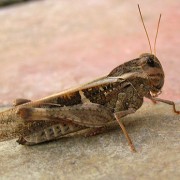What did John the Baptist Eat?
The Man in the Wilderness
In Matthew (the first Gospel), we’re introduced to John the Baptist who paves the way for a coming savior. In his description, he is distinguished from others in scripture by his surroundings (living wilderness), his attire and his choice of food. There have been many questions regarding Matthew 3:4, which mentions this “food”.
4 Now John wore a garment of camel’s hair and a leather belt around his waist, and his food was locusts and wild honey.

Many in the early church believed that this reference to locusts was actually meant to refer to the seeds of the carob tree, because the word used was similar in the Greek. However, most modern scholars accept that John the Baptist actually received his protein from Locusts.
The Greek word used for locust is “akris” and is used 3 other times in the New Testament, always to describe a locust.
Yes, Those Locusts
Locusts are an insect from the Acrididae family and also known as grasshoppers. Before you wonder why a famed biblical figure such as John the Baptist would live off of insects, consider this:
Many in the middle and far eastern world consider locusts to be a delicacy. The Oriental culture would often roast or season these animals, and Arabs eat the thorax which contains wing muscles. The Israelites were also allowed in their dietary law (kashrut) to consume locusts (according to Leviticus 11:22).
50-60% of the weight of the average locust is pure protein. In fact, this actually makes them a more complete protein source than beef (by protein/weight ratio).
In fact, locusts contain:
- Iodine
- Phosphorus
- Iron
- Thiamine
- Riboflavin
- Niacin
- and traces of calcium, magnesium and selenium.
Maybe John the Baptist was onto something.
Joshua Hill
Latest posts by Joshua Hill (see all)
- BREAKING NEWS: Sex is Good - April 8, 2014
- Finding The Real, Biblical Noah - April 6, 2014
